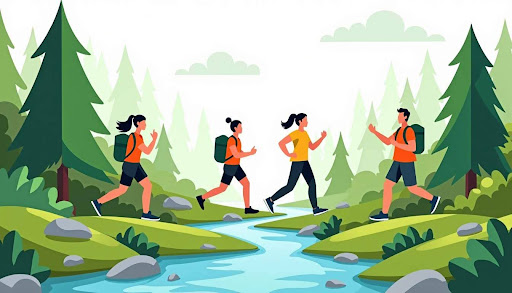6 Holistic Ways Outdoor Therapy Boosts Addiction Recovery

In recent years, addiction recovery has increasingly embraced holistic approaches that address the mind, body, and spirit. Among these, outdoor therapy, also known as wilderness therapy or nature based therapy, has gained significant attention for its unique ability to support healing in a natural setting. By integrating the therapeutic benefits of nature with evidence based addiction treatment, outdoor therapy offers a powerful complement to traditional recovery programs.
This article explores six holistic ways outdoor therapy boosts addiction recovery, highlighting how exposure to nature can foster emotional resilience, physical health, and sustainable sobriety.
1. Nature Reduces Stress and Enhances Emotional Regulation
One of the primary challenges in addiction recovery is managing stress and emotional triggers that can lead to relapse. Research consistently shows that spending time in natural environments reduces cortisol levels, the body’s primary stress hormone, and promotes a sense of calm.
For example, a 2020 study published in the International Journal of Environmental Research and Public Health found that participants who engaged in forest bathing (shinrin-yoku) experienced significant reductions in anxiety and depression symptoms. These emotional benefits are crucial for individuals in recovery, who often struggle with heightened emotional sensitivity and mood disorders.
Outdoor therapy sessions typically incorporate mindfulness practices, such as guided meditation or breathing exercises, while immersed in nature. This combination helps clients develop emotional regulation skills, enabling them to respond to cravings and stressors with greater resilience.
Additionally, the sensory experiences provided by nature, such as the sound of rustling leaves, the sight of vibrant flowers, and the fresh scent of pine, can further enhance mood and well-being. Engaging with these natural elements not only distracts individuals from negative thoughts but also fosters a deeper connection to their surroundings, promoting a sense of belonging and peace. Studies have shown that even brief interactions with nature can lead to improved cognitive function and emotional clarity, which are vital for those navigating the complexities of recovery.
Furthermore, group activities in natural settings, such as hiking or gardening, can facilitate social connections among participants. Building a supportive network is essential for recovery, as it provides individuals with a sense of community and shared experience. These social bonds can serve as a buffer against feelings of isolation and loneliness, which are common in addiction recovery. By fostering relationships in a serene environment, individuals can cultivate trust and empathy, further enhancing their emotional resilience and overall recovery journey.
2. Physical Activity in Nature Promotes Brain Health and Detoxification
Physical exercise is a well-established component of addiction recovery, aiding in detoxification, improving mood, and repairing brain function impaired by substance use. Outdoor therapy naturally integrates physical activity through hiking, climbing, or other nature-based exercises, which are often more engaging and less intimidating than gym workouts.

Engaging in physical activity outdoors also exposes individuals to fresh air and sunlight, which support vitamin D synthesis and improve circadian rhythms, both essential for restoring healthy sleep patterns disrupted by addiction. Improved sleep, in turn, enhances cognitive function and emotional stability.
Moreover, outdoor physical challenges foster a sense of accomplishment and self-efficacy. Overcoming natural obstacles can rebuild confidence and motivation, vital psychological assets for long-term recovery.
3. Connection with Nature Enhances Mindfulness and Presence
Mindfulness, the practice of being fully present and aware without judgment, is a cornerstone of many addiction recovery programs. Nature’s sensory richness provides an ideal setting for cultivating mindfulness, as it naturally draws attention to sights, sounds, smells, and textures.

Outdoor therapy encourages participants to slow down and engage deeply with their environment, whether by noticing the rustle of leaves, the flow of a stream, or the warmth of sunlight on their skin. This heightened awareness helps break the cycle of rumination and craving that often triggers relapse.
Additionally, nature’s vastness and timelessness can shift perspective, helping individuals see their struggles as part of a larger journey rather than an insurmountable burden. This reframing fosters acceptance and reduces self-stigma, which are critical for healing.
4. Social Support Through Group Activities Builds Community and Accountability
Recovery thrives in supportive social environments, and outdoor therapy often involves group activities that build trust, communication, and cooperation. Whether working together to set up camp, navigate trails, or complete team challenges, participants develop meaningful connections that extend beyond the therapy sessions.

These shared experiences in nature create a sense of camaraderie and belonging, counteracting the isolation and loneliness that frequently accompany addiction. Group outdoor therapy also fosters accountability, as peers encourage one another to stay committed to sobriety and personal growth.
Studies indicate that social support is one of the strongest predictors of successful recovery outcomes. By blending social interaction with the healing power of nature, outdoor therapy provides a holistic environment that nurtures both individual and collective well-being.
5. Nature’s Symbolism Inspires Hope and Personal Growth
Nature is rich with metaphors that resonate deeply with the recovery journey. The cycles of seasons, the resilience of trees weathering storms, and the steady flow of rivers all symbolize transformation, endurance, and renewal.
Outdoor therapy leverages this symbolism to inspire hope and motivate change. For instance, witnessing a seedling grow into a towering tree can mirror a client’s own potential for growth and recovery. This connection to natural rhythms encourages patience and persistence, reminding individuals that healing is a gradual process.
Furthermore, the solitude found in natural settings allows for introspection and self-discovery. Many clients report gaining new insights about their values, purpose, and identity when removed from the distractions of everyday life.
6. Reducing Environmental Triggers and Promoting Healthy Lifestyle Habits
Many individuals struggling with addiction face environmental triggers in urban or social settings, places associated with substance use or unhealthy behaviors. Outdoor therapy provides a safe, substance-free environment that removes these triggers and replaces them with positive, health-promoting experiences.
Spending extended time outdoors encourages the adoption of healthier lifestyle habits such as regular exercise, balanced nutrition (often through communal meal preparation), and adequate rest. These habits support physical recovery and reduce vulnerability to relapse.
Moreover, outdoor therapy often incorporates education about sustainable living and environmental stewardship, fostering a sense of responsibility and purpose beyond oneself. This broader connection can strengthen motivation for maintaining sobriety and contributing positively to the community.
Conclusion
Outdoor therapy offers a multifaceted, holistic approach to addiction recovery that addresses the complex interplay of physical, emotional, social, and spiritual factors. By reducing stress, promoting physical health, enhancing mindfulness, building social support, inspiring hope, and fostering healthy habits, nature-based therapy creates a nurturing environment for lasting healing.
As addiction treatment continues to evolve, integrating outdoor therapy into recovery programs represents a promising avenue for improving outcomes and enriching the recovery experience. For individuals seeking a deeper connection with themselves and the world around them, the healing power of nature can be a vital catalyst on the path to sobriety.
